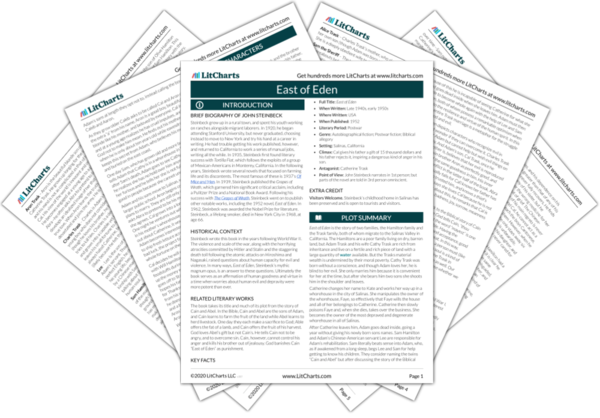East of Eden takes its name and its general storyline from the Biblical story of Adam’s sons, Cain and Abel: Cain believes God loves his brother Abel better than him, because God accepts a sacrifice from Abel but not from Cain. Cain then kills Abel out of anger and jealousy, and God banishes Cain “east of Eden” as a result. The book repeatedly thinks about religion and myth as a kind of storytelling, and affirms the value of stories when it comes to understanding difficult truths about life and human nature.
Re-enactments of the story of Cain and Abel are everywhere in the book. Their initials even appear in the names of Steinbeck’s characters: Charles almost kills Adam because his father loves Adam’s gift more than his. Catherine shoots Adam (nonfatally) because she cannot stand how good and loving he is. Cal knows his twin brother Aron is better loved, and fights the urge to destroy him. Eventually, Cal tells Aron the truth about their mother, and Aron runs away to war and dies: Cal kills Aron as Cain killed Abel. These resonances don’t just exist between the novel and the Biblical story. Rather, the story of Cain and Abel is important to the characters within East of Eden as well. Lee interprets the story of Cain and Abel with a great deal of clarity, saying that one needn’t be Christian to understand the importance of stories that tell important truths—he believes the story of Cain and Abel is a story about a man’s ability to choose between sin and virtue.
These kinds of discussions about religion and myth in the novel thus open up into discussions about the importance of storytelling (and story-interpreting) itself. The book alternates between first and third person, and after hundreds of pages the reader finally learns the name of the character narrating in the first person: John Steinbeck. This kind of self-reference (or “metafiction”) draws the reader’s attention to the fact that they, too, are reading a story—a story meant to teach them important truths if they are willing to investigate it thoroughly enough. Though East of Eden is deeply invested in a discussion of Christianity, it does not necessarily endorse the Christian faith. Rather, it construes the Bible as an important kind of mythology through which people can know themselves and their souls better if they are curious and diligent enough. What’s more, it conceives of fiction, too, as a kind of mythology—laden with the same kind of truth and meaning that can be found in religious texts.
Religion, Myth, and the Power of Stories ThemeTracker

Religion, Myth, and the Power of Stories Quotes in East of Eden
They landed with no money, no equipment, no tools, no credit, and particularly with no knowledge of the new country and no technique for using it. I don’t know whether it was a divine stupidity or a great faith that let them do it. Surely such venture is nearly gone from the world
“You’re trying to take him away! I don’t know how you’re going about it. What do you think you’re doing?”
“The proofs that God does not exist are very strong, but in lots of people they are not as strong as the feeling that He does.”
And just as there are physical monsters, can there not be mental or psychic monsters born? The face and body may be perfect, but if a twisted gene or a malformed egg can produce physical monsters, may not the same process produce a malformed soul?
To hell with that rotten century! Let’s get it over and the door closed shut on it! Let’s close it like a book and go on reading! New chapter, new life. A man will have clean hands once we get the lid slammed shut on that stinking century. It’s a fair thing ahead. There’s no rot on this clean new hundred years. It’s not stacked, and any bastard who deals seconds from this new deck of years—why, we’ll crucify him head down over a privy. Oh but strawberries will never taste as good again and the thighs of women have lost their clutch!
The church and the whorehouse arrived in the Far West simultaneously. And each would have been horrified to think it was a different facet of the same thing. But surely they were both intended to accomplish the same thing: the singing, the devotion, the poetry of the churches took a man out of his bleakness for a time, and so did the brothels.
“We are descended from this. This is our father. Some of our guilt is absorbed in our ancestry. What chance did we have? We are the children of our father. It means we aren’t the first.”
“A great and lasting story is about everyone or it will not last.”
“But the Hebrew word, the word timshel—‘Thou mayest’—that gives a choice. It might be the most important word in the world. That says the way is open. That throws it right back on a man…why, that makes a man great, that gives him stature with the gods, for in his weakness and his filth and his murder of his brother he has still the great choice. He can choose his course and fight it through and win.”
“This is not theology. I have no bent toward gods. But I have a new love for that glittering instrument, the human soul.”
“Dear Lord...let me be like Aron. Don’t make me mean. I don’t want to be…I don’t want to be mean. I don’t want to be lonely.”
All novels, all poetry, are built on the never-ending contest in ourselves of good and evil. And it occurs to me that evil must constantly respawn, while good, while virtue, is immortal.
Where Aron was received, Cal was rebuffed for doing or saying exactly the same thing.
“He’s crammed full to the top with every good thing and every bad thing.”
















